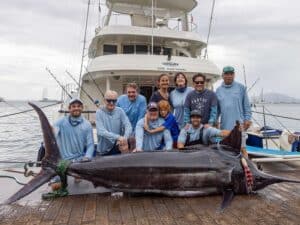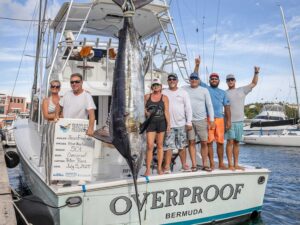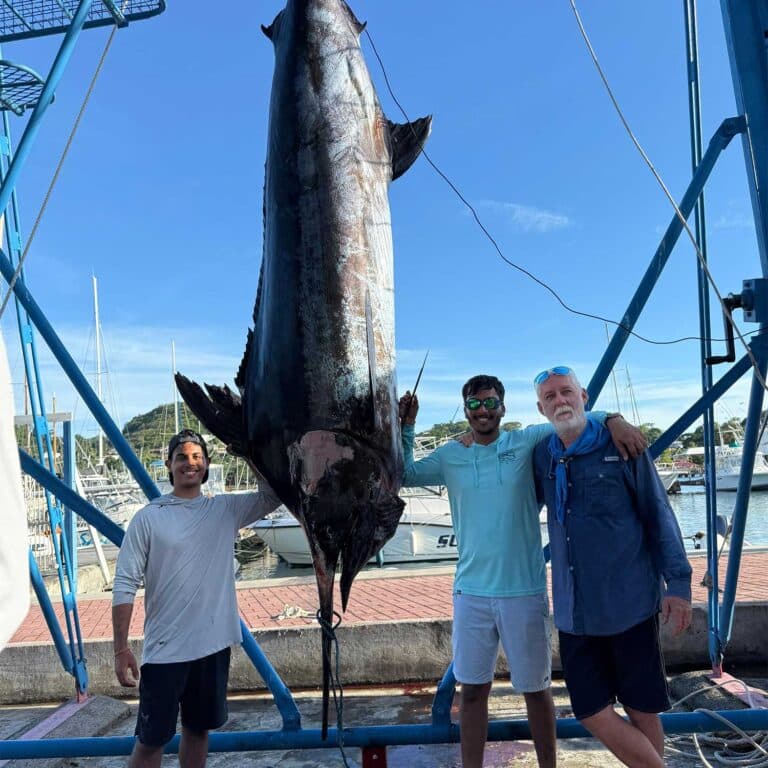
It’s true — we killed way too many billfish back in the old days. We would throw them on the charter dock in hopes of attracting our next party, or just kill a fish in an attempt to sell a mount. Then once we got better at fishing, we learned how not to miss the spindlebeaks by hooking them on J hooks. The same evolution was seen with the guys in Australia as they used big baits with giant J hooks, and a really long drop-back. Each fish was gut-hooked because of the possibility that each bite really could be a grander or the biggest marlin ever caught. And there is no doubt that you have an advantage as an angler when you gut-hook a billfish — I’m guilty; I did it every time we tried to catch a record fish!
“When it comes to teams landing a large marlin in a tournament, can we justify it in a way that these big fish will eventually die from natural causes anyway?”
I remember when The Billfish Foundation came out with its “Release the Baby Marlin” campaign. It got me thinking that maybe we should kill the small fish and let the big fish go since the big marlin are the breeders and have survived all of those years, meaning they have strong genes that can be passed on to their offspring. I thought the little marlin could maybe be managed like young deer in a similar way to how a hunter tries to thin the herd so the bucks get bigger … maybe it would work with fishing? Oh no, was I wrong.
Catching a big marlin or that ever-mysterious grander is like winning the lottery. And in reality these days, we all want to release most all of the billfish we catch and kill only the ones that have a good chance of producing a big check at a tournament or breaking a world record. The guys I talk to in my tournaments are really great with their fish: If one dies, they fillet it and bring it back to smoke the meat, and they take a lot of pride in making it the best food you have ever tasted. It’s not like the old days when the fish were wasted and hung up on the scale overnight, or went to that famous “orphanage” that some tournament directors told us the meat went to. I always wanted to go visit this mythical orphanage, but nobody seemed to know where it was located.
But there are still quite a few big marlin killed in tournaments, especially in the Gulf of Mexico. These events generate a huge economic impact for the community, and also attract more boats in the tournaments due to the “lottery effect” because every team has a chance to catch a tournament-winning marlin. And when it comes to teams landing a large marlin in a tournament, can we justify it in a way that these big fish will eventually die from natural causes anyway? We might think marlin are immortal — scientists believe males live up to 18 years and the females live to be 27 — but they sink to the bottom like mud darts after living their life. Think of trees falling in the forest: Nobody sees billfish die because they are pelagic fish and don’t wash up on the beach for the public to see.
We all desire to catch the biggest fish in the ocean, but not all of us want to kill it. We might be lucky enough to come across a full-grown one once in our lifetime, especially if we fish enough, or maybe we can just get lucky like many people who’ve fished only a couple of times have done. But when you do catch the big one, you have that choice of releasing it or taking it to the scales.
I recently caught a big blue while fishing out of Tropic Star Lodge in Piñas Bay, Panama, and initially I wanted to bring the marlin to the scales because I thought it was large enough to be a lodge record and Panama’s first grander. But I decided to release it, and I was — and I still am— very happy to have let that big girl go. My wife did snap some good photos of the fish though. And maybe that marlin will lay a couple million eggs that will eventually grow up be big marlin as well — and we can only hope that our kids and friends will be able to catch these fish one day in the future.
And for the ones that we do catch, we all know about the big ones that got away…. Trust me, I have a couple too.








